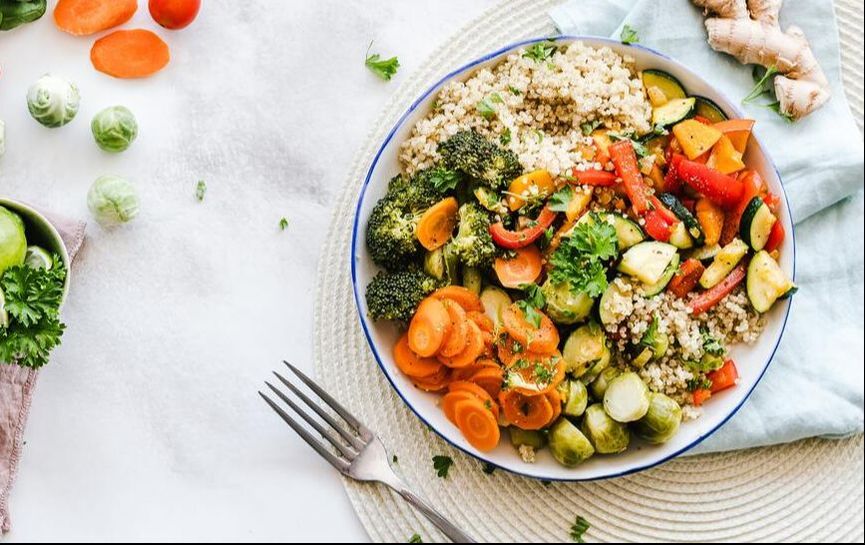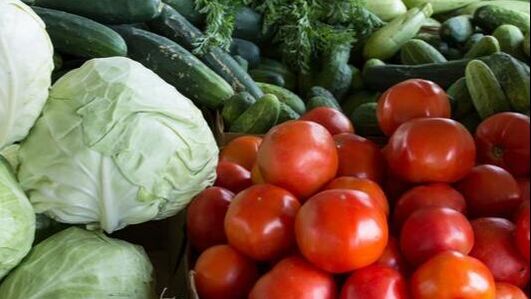People who eat more vegetables and fruits as part of an overall healthy diet are likely to have a reduced risk of some chronic diseases. Vegetables provide nutrients vital for health and maintenance of your entire body.
Whether you include meat and dairy in your diet or not, more plants equates to better health outcomes.
Nutrients
- Most vegetables are naturally low in fat and calories. None have cholesterol. (Sauces or seasonings may add fat, calories, and/or cholesterol.)
- Dietary fibre from vegetables, as part of an overall healthy diet, helps reduce blood cholesterol levels, lower risk of heart disease, and helps to keep a healthy gut microbiome.
- Diets rich in potassium may help to maintain healthy blood pressure. Vegetable sources of potassium include sweet potatoes, white potatoes, white beans, tomato products , beet greens, soya, lima beans, spinach, lentils, & kidney beans.
- Fibre is important for proper bowel function. It helps reduce constipation and diverticulosis. Fibre-containing foods such as vegetables help provide a feeling of fullness with fewer calories.
- Folate (folic acid) helps the body form red blood cells. Women of childbearing age who may become pregnant should consume adequate folate from foods to reduce the risk of neural tube defects, spina bifida, and anencephaly during fetal development.
- Vitamin A keeps eyes and skin healthy and helps to protect against infections.Vitamin C helps heal cuts and wounds and keeps teeth and gums healthy. Vitamin C also aids in iron absorption.
Health benefits
Eating a diet rich in vegetables and fruits as part of an overall healthy diet reduces the risk for heart disease, including heart attack and stroke.
Research done by the Imperial College in London in 2017, which is published in the International Journal of Epidemiology, estimate approximately 7.8 million premature deaths worldwide could be potentially prevented every year if people ate 10 portions, or 800 g, of fruit and vegetables a day.
The team found that although five portions of fruit and vegetables a day reduced disease risk, the greatest benefit came from eating 800g a day (roughly equivalent to ten portions - one portion of fruit or vegetables if defined as 80g).
The study, which was a meta-analysis of all available research in populations worldwide, included up to 2 million people, and assessed up to 43,000 cases of heart disease, 47,000 cases of stroke, 81,000 cases of cardiovascular disease, 112,000 cancer cases and 94,000 deaths.
Some pretty glaring statistics came out of the research.
Here's what they found;
- 24 % reduced risk of heart disease
- 33 % reduced risk of stroke
- 28 % reduced risk of cardiovascular disease
- 13 % reduced risk of total cancer
- 31 % reduction in dying prematurely
Now to be transparent these numbers are calculated in comparison to not eating any fruit and vegetables. But if this is a sliding scale, and we earn points for a good and healthy long life by eating more plant foods, I'll swallow that dill... I mean pill.... I mean...
Besides curbing some of the most prolific chronic diseases in North America, eating more veg has more amazing health benefits;
- Diets rich in foods containing fibre, such as vegetables and fruits and other plant foods, may reduce the risk of obesity, and type 2 diabetes.
- Eating vegetables and fruits rich in potassium as part of an overall healthy diet may lower blood pressure, and may also reduce the risk of developing kidney stones and help to decrease bone loss.
- Eating foods such as vegetables that are lower in calories per cup instead of some other higher-calorie food may be useful in helping to maintain a healthy weight.
I did however have question in the back of my mind as I haven't ever tracked my food, or more particularly my veggie intake..Was I eating this protective amount of whole plant foods??
Most days; absolutely! We don't eat out a lot so I really dictate whats on the plate, and that usually includes heaping amounts of veg. But when I review my Food & Mood Journal after about 2 months of tracking, there was a few days, even in the summer where veggies abound, when I ate less than 6 serving in a day.
Not that this is bad news, studies point to eating as little as 5 servings per day having some beneficial effects, but truly, I'm in it for the long run! I shooting for healthy @ 100!
What I took out of this was more than just upping my veg game on a daily basis, it's when we are the conscious observer, we can decide to take action on tangible reflection. Okay what I mean is, without keeping a journal, I might assume that I would be getting more than enough servings of veggies and fruits everyday, but without journaling, I was just guessing.
Even though a few days in a month isn't a big reflection of my overall health measures, it statistically adds up to a small percentage a year. I'm not going to be overly concerned and track my veggie intake like a crazy lady because I know most days I'm getting well over 10 servings and eat a well rounded whole foods, plant based diet, but I am more aware than I was before and where ever I might feel the veg intake was low that day, a big salad shall appear! And to be honest, I was assuming until I had actual data.
How about you? Do you know how many veggies and fruit servings you get in a day?
In Canada, lets look at
WHAT IS ONE "SERVING"?
125 mL (½ cup) fresh, frozen or canned vegetables or fruits
250 mL (1 cup) raw leafy veggies or salad
125 mL (½ cup) 100% fruit & vegetable juice (Only occasionally in small amounts)
1 piece of fruit ( or a cup of berries are a good option to keep sugars down)
ONE SERVING OF FRUIT CAN BE:
1 medium banana
6 strawberries
1 plum
20 grapes (apx 1 cup)
1 medium apple
1 medium peach
*Keep juice for an occasional treat and eat the whole fruit with its fibre still intact.
ONE SERVING OF VEGETABLE CAN BE:
1/2 cup (125 mL) broccoli florets
10 baby carrots or 2 medium size carrots
1 roma tomato
1/2 of a baked sweet potato
1 ear of corn
1/2 cup of chopped mixed vegetables
CANADA’S FOOD GUIDE RECOMMENDS
- Get 7-10 servings of vegetables and fruit everyday for health.
- Eat at least one dark green and one orange vegetable each day.
- Go for dark green vegetables such as broccoli, kale, swiss chard, and spinach.
- Go for orange vegetables such as carrots, sweet potatoes, and winter squash.
- Choose vegetables and fruit prepared with little or no added fat, sugar or salt.
- Enjoy vegetables steamed, baked or stir-fried instead of deep fried.
- Eat a wide variety of colourful vegetables and fruits everyday, think “eat the rainbow”.
So why are the oranges and greens so important? Read more here.
Whether we're eating a ton of veggie, or maybe we aren't, whether we're plant-based or not, there is no 1 diet that is best for everyone, but eating more veg no matter what camp your in, seems to be a healthy habit. Another healthy habit to thrive in life is to be a conscious observer of our own health!
We naturally check in with ourselves on a daily basis to acknowledge how we are feeling, but do we keep a log?
We track our finances and spending habits, we log our hours worked and our time management in life, we track our home renovations, we track the data usage on our phone, yet do we pay attention to our own health and nutrition???
My clients know this amazing tool before they even walk into my office, it's part of my intake forms, I request this before I confirm an appointment because it is invaluable, although just a starting point, it something to start with! The longer you keep, not only a food journal but, a mood and overall health journal, the more empirical data you have collected about yourself, your eating habits, your lifestyle habits, and how they might affect your mood and health as a whole.
Whether you are working with a nutrition or health professional or starting the journey solo, here is my free Food & Mood Tracker to download and start tracking. You might be surprised in 3 months what looks like correlations between the food you eat, the mood, and your overall health & energy..
There are lots of great apps that you can download that specifically look at your nutrient intake, and might be easier to fill out, but I am such a visual person, I like things on paper, right in front of me, that include more than just what I put in my mouth, or how many steps I take in a day.
Do you know what I found out from keeping a Food and Mood journal???
That the 1 cup lovely cup of coffee I was drinking in the morning was sabotaging my energy levels and making me feel slightly anxious for the rest of the day. Was it overt enough to realize without the journal, maybe, but day by day, there was always some other reason in my head...until I saw it in black and white.
I also discovered that there is always more room for kale!
What is your hypothesis of what's helping or hurting your health??
Now it's time for the data!! Download the free tracker and start observing your health now!
In Health & Happiness my Friends

